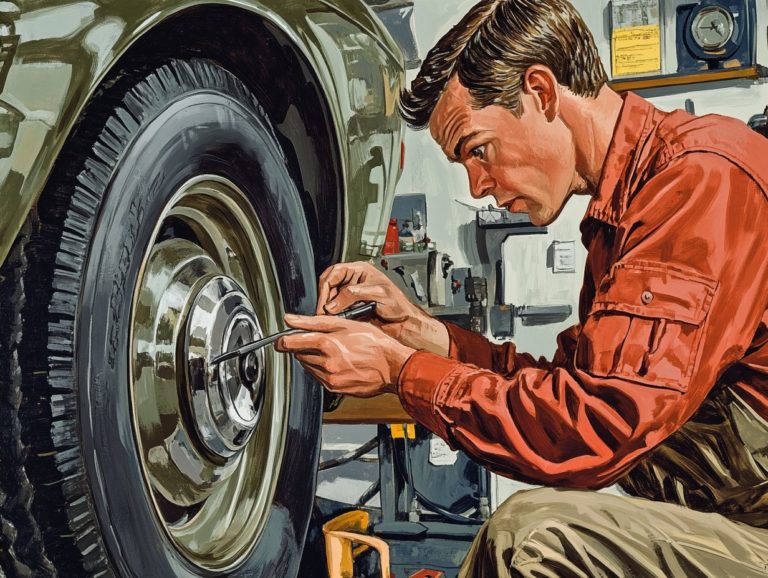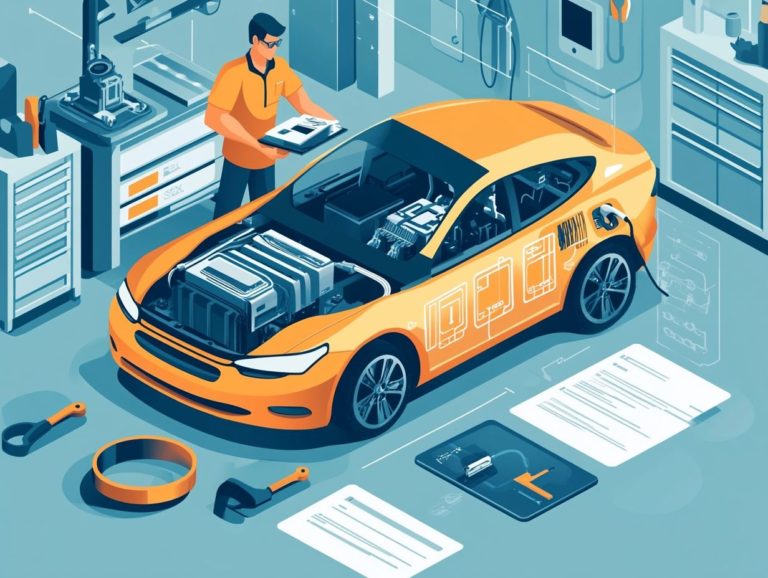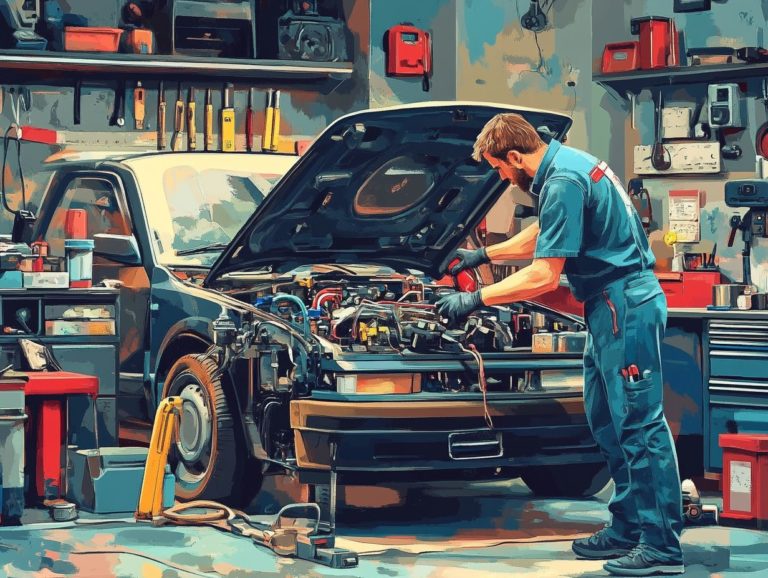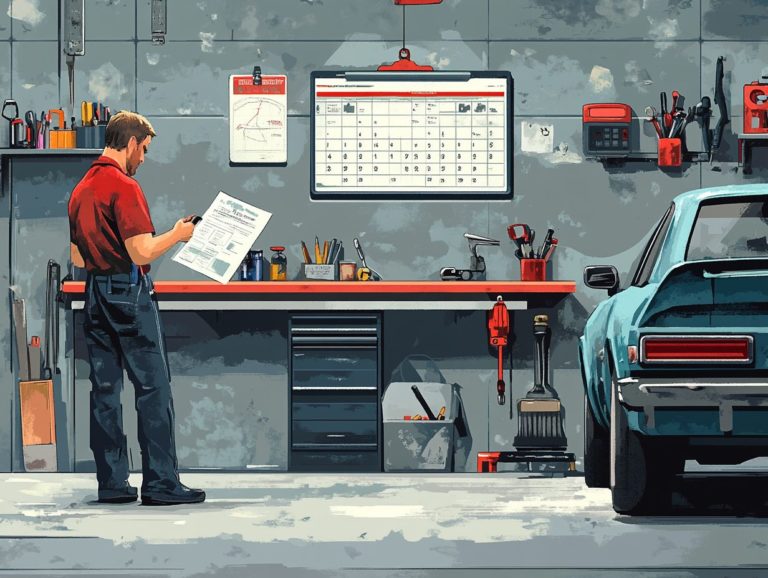How to Keep Your Engine Running Smoothly
Maintaining your engine is essential for achieving optimal performance and ensuring the longevity of your vehicle. Regular maintenance helps you avoid costly repairs and keeps your engine operating smoothly.
This article explores the significance of engine upkeep, highlights common warning signs to watch for, and offers indispensable tips for both basic and advanced maintenance.
Whether you re a seasoned car enthusiast or a new owner, understanding these practices will empower you to take exceptional care of your engine, ultimately enhancing your driving experience.
Contents
- Key Takeaways:
- The Importance of Engine Maintenance
- Signs of Engine Trouble
- Basic Engine Maintenance
- Advanced Engine Maintenance
- Tips for Keeping Your Engine Running Smoothly
- Frequently Asked Questions
- What are the benefits of keeping my engine running smoothly?
- How often should I get my engine checked for maintenance?
- What are some signs that my engine may need maintenance?
- What type of oil should I use to keep my engine running smoothly?
- How can I prevent my engine from overheating?
- What should I do if my engine is running rough?
Key Takeaways:

- Regular maintenance is crucial for smooth operation and longevity of your engine.
- Watch for signs like strange noises and unusual smells to catch problems early.
- Basic tasks like oil changes and fluid checks are essential for performance.
The Importance of Engine Maintenance
Engine maintenance is vital for your vehicle’s reliability and longevity. By prioritizing proper care, you enhance performance, improve safety, and prevent costly repairs down the line.
Engaging in regular check-ups and thorough inspections can significantly impact your engine’s lifespan, leading to a smoother driving experience. Paying close attention to these details protects your investment and ensures your vehicle meets safety standards while performing efficiently.
Why Regular Maintenance is Necessary
Regular maintenance is essential for maximizing your vehicle’s reliability. When parts work well, you significantly reduce the chances of unexpected repairs and costly breakdowns.
For example, consistent oil changes keep your engine lubricated and enhance its performance by minimizing friction. Regular battery inspections prevent sudden failures, ensuring your vehicle starts smoothly every time.
Don t overlook checks like tire rotations and brake inspections; these are crucial for your vehicle’s safety and handling. By staying committed to these practices, you can enjoy a dependable and high-performing vehicle, making each drive a pleasure.
Signs of Engine Trouble
Identifying signs of engine trouble is essential for your vehicle s condition and a safe driving experience. Pay attention to common warning signs like unusual noises, sluggish acceleration, or warning lights on your dashboard they can signal serious issues.
Ignoring these symptoms could lead to more severe complications and costly repairs. Stay vigilant and proactive about your engine health. Regular inspections by a mechanic, along with being aware of your driving habits, can help you detect problems early, enhance safety, and prevent further damage.
Common Warning Signs
Common warning signs of engine trouble include unusual sounds, warning lights, and irregular vehicle performance, all of which need your immediate attention.
Changes in tire pressure can indicate more than just a flat tire; they may hint at misalignment or brake issues. If the brakes feel sluggish or make grinding noises, this could jeopardize your safety and comfort on the road.
An unfamiliar engine noise like a knocking or hissing often points to deeper issues that shouldn t be ignored. By being attentive and noting these warning signs, you can ensure safer journeys while enhancing your overall driving experience, reducing the chances of costly repairs in the future.
Basic Engine Maintenance
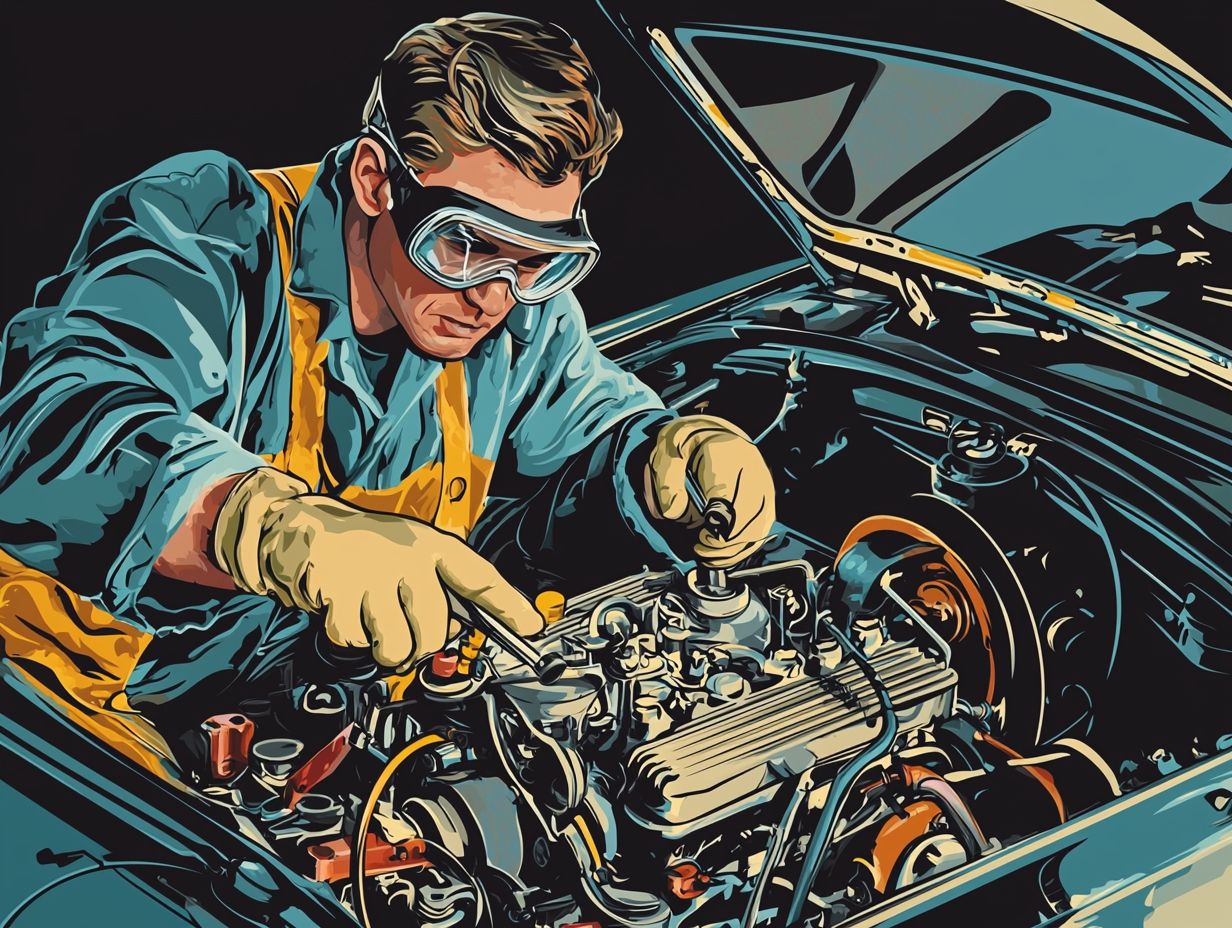
Basic engine maintenance includes a range of straightforward tasks that can greatly enhance your vehicle’s performance and longevity. Key elements of this routine include:
- Regular oil changes
- Monitoring fluid levels
- Attending to battery maintenance
- Ensuring that both air filters and tires are in peak condition
A structured maintenance schedule preserves engine efficiency. It can help you avoid costly repairs.
Simple actions such as tire rotation and fluid checks not only boost engine performance but also play an important part in ensuring your driving safety and comfort.
Oil Changes and Filter Replacements
Oil changes and filter replacements are essential cornerstones of engine maintenance that guarantee optimal lubrication and functionality.
By regularly updating your engine oil, you promote smoother operation and significantly extend the engine’s lifespan. Fresh oil minimizes friction between moving parts, allowing for peak performance. A clean oil filter effectively captures contaminants that could hinder flow and efficiency.
Neglecting these crucial tasks can lead to serious engine problems, such as overheating or excessive wear. Schedule routine oil changes and filter replacements to maintain your engine s health. This ensures that your driving experience remains safe and efficient for the long haul.
Want your vehicle to run smoothly? Follow these essential maintenance tips!
Checking and Replacing Fluids
Checking and replacing fluids is an important aspect of basic engine maintenance that can help you prevent a range of mechanical issues.
Regular inspections of essential fluids, such as engine oil, coolant, brake fluid, and transmission fluid, significantly enhance your vehicle’s efficiency and safety. Engine oil lubricates internal components, reduces friction, and prevents excessive wear.
Coolant helps your engine maintain a stable temperature, which is vital for optimal performance. Brake fluid is critical for ensuring your braking system functions properly, transmitting force from the brake pedal to the brakes. Meanwhile, transmission fluid lubricates and cools the components within the transmission system, facilitating smooth gear shifts.
By diligently maintaining these fluids, you ensure your car operates safely and efficiently, steering clear of costly repairs down the road.
Advanced Engine Maintenance
Advanced engine maintenance involves tackling more intricate tasks, such as troubleshooting and diagnosing issues that may arise in your vehicle’s operation. This level of maintenance is crucial for ensuring optimal engine performance and requires a deep understanding of the mechanics at play.
By accurately diagnosing problems, you can make informed decisions about necessary repairs or replacements. This ultimately extends your engine’s lifespan and enhances your vehicle’s overall condition. Regular assessments are equally important for maintaining automotive safety and ensuring that your driving experience remains enjoyable.
Troubleshooting and Diagnosing Issues
Troubleshooting and diagnosing issues are vital processes in advanced engine maintenance that empower you to uncover underlying problems that may hinder engine performance.
Use a clear method to check different parts. This helps you find problems easily. Examine components like the ignition system, fuel injectors, and exhaust systems to pinpoint malfunctions with precision. Utilizing diagnostic tools like oscilloscopes (devices that measure electrical signals) and OBD-II scanners (tools that read vehicle data) allows for a more accurate evaluation of engine data, revealing critical insights into your vehicle’s condition.
Regular mechanic inspections help you identify minor issues before they escalate and deepen your understanding of wear and tear on essential parts. This thorough analysis is crucial for prolonging engine life and ensuring that your vehicle operates at its optimal performance.
Replacing Parts and Components

Replacing parts and components is an essential aspect of regular engine care. It plays a direct role in your vehicle’s safety and performance.
Swapping out common components like brake pads, air filters, and oil filters helps ensure your vehicle runs smoothly and safely. Ignoring these tasks can lead to decreased braking efficiency, reduced engine performance, and potentially costly repairs later on.
Sticking to a maintenance schedule isn t just a suggestion; it s vital for extending your vehicle s lifespan and enhancing your driving experience. For example, worn-out brake pads can threaten your stopping power. Clogged filters can restrict engine airflow, leading to lower fuel efficiency.
Stay proactive to optimize your vehicle’s performance and maintain safety on the road.
Tips for Keeping Your Engine Running Smoothly
Maintaining the smooth operation of your vehicle hinges on a blend of effective maintenance strategies and proactive driving habits. These elements work together to guarantee optimal performance and enhance the reliability of your engine.
Best Practices for Maintaining Your Engine
To keep your engine in top shape, prioritize regular routine checks and a well-structured maintenance schedule. This approach ensures your vehicle remains in optimal condition.
Incorporate essential tasks into your routine like checking tire pressure, monitoring fluid levels, and changing engine oil regularly to significantly boost performance and safety. Keeping a close watch on tire pressure not only improves fuel efficiency but also minimizes the risk of blowouts, which is crucial for safety. Adequate fluid levels, including coolant, brake fluid, and transmission fluid, are essential for preventing overheating and ensuring smooth operation.
By following these best practices, you extend your engine’s lifespan and enhance overall driving safety, giving you peace of mind on every journey.
Frequently Asked Questions
What are the benefits of keeping my engine running smoothly?
Keeping your engine running smoothly helps improve fuel efficiency, reduce emissions, and prolong its lifespan.
How often should I get my engine checked for maintenance?

It is recommended to have your engine checked for maintenance every 6 months or 6,000 miles, whichever comes first.
What are some signs that my engine may need maintenance?
Signs that your engine may need maintenance include strange noises, decreased performance, and warning lights on your dashboard.
What type of oil should I use to keep my engine running smoothly?
It’s important to use the type of oil recommended for your vehicle, as different engines may require different oils. Refer to your owner’s manual or consult a mechanic for the best choice.
How can I prevent my engine from overheating?
Regularly check and top off your coolant levels, ensure proper airflow through your radiator, and avoid excessive idling to help prevent overheating.
What should I do if my engine is running rough?
If your engine is running rough, it’s best to take it to a mechanic for a diagnostic check. Possible causes may include a faulty spark plug, dirty fuel injectors, or a clogged air filter.
Don t wait until it s too late check your engine today!

